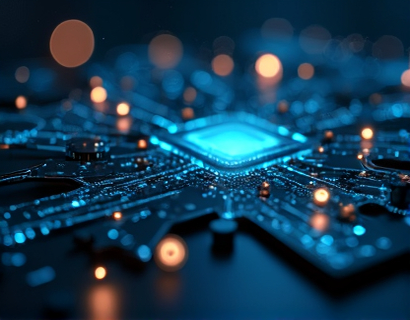AI-Powered Adaptive Learning: Transforming Education for Students and Adults
The educational landscape is undergoing a significant transformation with the integration of AI-powered adaptive learning technologies. This innovative approach is redefining how students and lifelong learners access and engage with educational content, offering personalized experiences that cater to individual needs, styles, and paces. The core of this revolution lies in the ability of AI systems to analyze vast amounts of data, adapt in real-time, and provide tailored educational pathways that enhance learning outcomes and foster a more dynamic and supportive learning environment.
Understanding AI-Powered Adaptive Learning
AI-powered adaptive learning is a sophisticated educational technology that uses machine learning algorithms to create customized learning experiences. These systems continuously assess a learner's performance, understanding, and preferences, adjusting the content and difficulty level accordingly. The goal is to provide an optimal learning path for each individual, ensuring that they receive the right challenges at the right time, thereby maximizing engagement and retention.
The foundation of adaptive learning systems is built on a combination of data collection, analysis, and response. These systems gather data through various interactions, such as quizzes, assignments, and user feedback. Advanced algorithms then process this data to identify patterns, strengths, and areas for improvement. Based on these insights, the system dynamically adjusts the learning materials, offering personalized resources, explanations, and exercises that align with the learner's unique profile.
Personalized Learning for Diverse Needs
One of the most significant advantages of AI-powered adaptive learning is its ability to cater to a wide range of learning styles and needs. Traditional educational methods often struggle to accommodate diverse learning preferences, leaving many students feeling left behind or unchallenged. Adaptive learning systems, however, can adapt to visual, auditory, kinesthetic, and other learning styles, ensuring that each student receives content in a format that resonates with them.
For instance, a visual learner might benefit from interactive diagrams and videos, while an auditory learner might prefer podcasts and spoken explanations. Kinesthetic learners, who learn best through hands-on activities, can engage with simulations and interactive exercises. By recognizing and responding to these differences, adaptive learning systems create an inclusive environment where all learners can thrive.
Instant Feedback and Continuous Improvement
Another key feature of AI-powered adaptive learning is the provision of instant feedback. Unlike traditional classrooms where feedback is often delayed, adaptive learning systems offer immediate responses to learner actions. This real-time feedback is crucial for reinforcing correct concepts and quickly addressing misunderstandings. It helps learners stay on track, build confidence, and maintain momentum.
Moreover, the continuous feedback loop enables learners to track their progress and identify areas for improvement. This transparency fosters a growth mindset, encouraging learners to view challenges as opportunities for growth rather than obstacles. The data-driven approach also allows educators to monitor student performance and intervene when necessary, providing targeted support to ensure no one falls behind.
Empowering Lifelong Learners
Adaptive learning is not limited to traditional students; it is equally beneficial for lifelong learners seeking to upskill or reskill in a rapidly changing world. The flexibility and accessibility of AI-powered platforms make continuous learning more attainable, breaking down barriers of time, location, and cost. Professionals can fit learning into their busy schedules, advancing their careers and staying competitive in their fields.
For example, a working professional might use an adaptive learning platform to learn a new programming language or master data analysis tools. The system can adapt to their schedule, providing lessons and exercises that fit into their available time, whether it's during commutes, lunch breaks, or evenings. This flexibility ensures that learning remains a priority and a continuous process, rather than a one-time event.
Enhancing Engagement and Motivation
Engagement and motivation are critical factors in successful learning. AI-powered adaptive learning systems are designed to keep learners engaged through interactive and personalized content. By tailoring the learning experience to individual interests and goals, these systems increase the relevance and appeal of the material. Interactive elements such as gamification, quizzes, and real-world applications make learning more enjoyable and less tedious.
Furthermore, the sense of accomplishment that comes from overcoming personalized challenges and achieving milestones boosts motivation. Learners are more likely to persist and deepen their engagement when they see tangible progress and feel a sense of control over their learning journey. This positive feedback loop creates a virtuous cycle of engagement and achievement.
Supporting Educators and Instructors
Adaptive learning systems also provide valuable tools and insights for educators and instructors. These platforms offer detailed analytics and reports that help teachers understand student performance, identify common misconceptions, and tailor their instruction accordingly. This data-driven approach enables educators to provide more targeted and effective support, enhancing the overall learning experience.
Additionally, adaptive learning can alleviate some of the administrative burdens on educators, allowing them to focus more on teaching and less on grading and tracking progress. This shift not only improves the efficiency of the educational process but also enhances the quality of teacher-student interactions, fostering a more supportive and collaborative learning environment.
Challenges and Considerations
While AI-powered adaptive learning offers numerous benefits, it is essential to acknowledge and address potential challenges. One key consideration is data privacy and security. Ensuring that learner data is handled with the utmost care and compliance with regulations is paramount. Transparent policies and robust security measures are necessary to build trust and protect sensitive information.
Another challenge is the potential for over-reliance on technology. While adaptive learning tools are powerful, they should complement rather than replace human interaction and guidance. Educators play a crucial role in providing emotional support, mentorship, and social interaction, which are essential components of a well-rounded education.
The Future of Personalized Education
The integration of AI in education is just the beginning. As technology continues to evolve, we can expect even more sophisticated and intuitive adaptive learning systems. Future developments may include more advanced natural language processing, enhanced virtual and augmented reality experiences, and deeper integration with other educational technologies.
The ultimate goal is to create a seamless, personalized learning journey that empowers every individual to reach their full potential. By leveraging the power of AI, we can break down barriers to education, make learning more accessible and effective, and prepare learners for the challenges of the future. The potential for AI-powered adaptive learning to transform education is immense, offering a brighter, more inclusive, and more effective educational landscape for all.










































